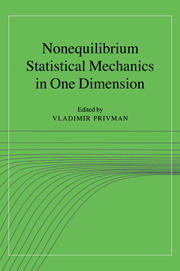Book contents
- Frontmatter
- Contents
- Contributors
- Preface
- Part I Reaction-Diffusion Systems and Models of Catalysis
- Part II Kinetic Ising Models
- Part III Ordering, Coagulation, Phase Separation
- Part IV Random Adsorption and Relaxation Processes
- 10 Random and cooperative sequential adsorption: exactly solvable models on 1D lattices, continuum limits, and 2D extensions
- 11 Lattice models of irreversible adsorption and diffusion
- 12 Deposition-evaporation dynamics: jamming, conservation laws, and dynamical diversity
- Part V Fluctuations in Particle and Surface Systems
- Part VI Diffusion and Transport in One Dimension
- Part VII Experimental Results
- Index
- Abbreviations
10 - Random and cooperative sequential adsorption: exactly solvable models on 1D lattices, continuum limits, and 2D extensions
Published online by Cambridge University Press: 18 December 2009
- Frontmatter
- Contents
- Contributors
- Preface
- Part I Reaction-Diffusion Systems and Models of Catalysis
- Part II Kinetic Ising Models
- Part III Ordering, Coagulation, Phase Separation
- Part IV Random Adsorption and Relaxation Processes
- 10 Random and cooperative sequential adsorption: exactly solvable models on 1D lattices, continuum limits, and 2D extensions
- 11 Lattice models of irreversible adsorption and diffusion
- 12 Deposition-evaporation dynamics: jamming, conservation laws, and dynamical diversity
- Part V Fluctuations in Particle and Surface Systems
- Part VI Diffusion and Transport in One Dimension
- Part VII Experimental Results
- Index
- Abbreviations
Summary
Random sequential adsorption (RSA) and cooperative sequential adsorption (CSA) on 1D lattices provide a remarkably broad class of far-fromequilibrium processes that are amenable to exact analysis. We examine some basic models, discussing both kinetics and spatial correlations. We also examine certain continuum limits obtained by increasing the characteristic size in the model (e.g., the size of the adsorbing species in RSA, or the mean island size in CSA models having a propensity for clustering). We indicate that the analogous 2D processes display similar behavior, although no exact treatment is possible here.
Introduction
In the most general scenario for chemisorption or epitaxial growth at single crystal surfaces, species adsorb at a periodic array of adsorption sites, hop between adjacent sites, and possibly desorb from the surface. Such processes can be naturally described within a lattice-gas formalism. The microscopic rates for different processes in general depend on the local environment and satisfy detailed-balance constraints. The net adsorption rate is determined by the difference in chemical potential between the gas phase and the adsorbed phase. In many cases, thermal desorption can be ignored for a broad range of typical surface temperatures, T. Furthermore, for sufficiently low T, thermally activated surface diffusion is also inoperative, so then species are irreversibly (i.e., permanently) bound at their adsorption sites. Henceforth, we consider the latter regime exclusively. Clearly the resultant adlayer is in a far-from-equilibrium state determined by the kinetics of the adsorption process.
- Type
- Chapter
- Information
- Nonequilibrium Statistical Mechanics in One Dimension , pp. 205 - 228Publisher: Cambridge University PressPrint publication year: 1997
- 3
- Cited by

